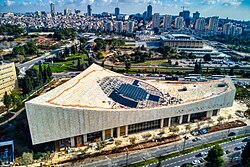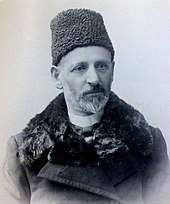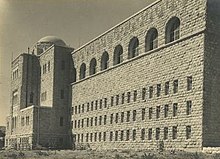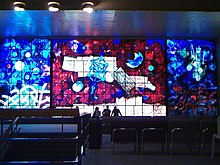| National Library of Israel | |
|---|---|
| הספרייה הלאומית | |
 | |
 New building by Herzog & de Meuron (2023) New building by Herzog & de Meuron (2023) | |
| 31°46′38″N 35°12′12″E / 31.77722°N 35.20333°E / 31.77722; 35.20333 | |
| Location | Jerusalem, Israel |
| Established | 1892; 133 years ago (1892) |
| Reference to legal mandate | The Legal Deposit of generally available documents |
| Collection | |
| Items collected | Unique collections of manuscripts, special collections of books, music, radio and television programmes, film, theatre, maps, posters, pictures, photographs, electronic documents and newspapers. |
| Size | 5 million volumes |
| Other information | |
| Budget | Approximately 100 million NIS (₪) |
| Director | Oren Weinberg |
| Employees | 367 |
| Website | nli.org.il |
The National Library of Israel (NLI; Hebrew: הספרייה הלאומית, romanized: HaSifria HaLeumit; Arabic: المكتبة الوطنية في إسرائيل), formerly Jewish National and University Library (JNUL; Hebrew: בית הספרים הלאומי והאוניברסיטאי, romanized: Beit Ha-Sfarim Ha-Le'umi ve-Ha-Universita'i), is the library dedicated to collecting the cultural treasures of Israel and of Jewish heritage. The library holds more than 5 million books, and is located in the Government complex (Kiryat HaMemshala) near the Knesset.
The National Library owns the world's largest collections of Hebraica and Judaica, and is the repository of many rare and unique manuscripts, books and artifacts.
History
B'nai Brith library (1892–1925)


The establishment of a Jewish National Library in Jerusalem was the brainchild of Joseph Chazanovitz [he] (1844–1919). His idea was creating a "home for all works in all languages and literatures which have Jewish authors, even though they create in foreign cultures." Chazanovitz collected some 15,000 volumes which later became the core of the library.
The B'nai Brith library, founded in Jerusalem in 1892, was the first public library in the region of Palestine to serve the Jewish community. The library was located on B'nai Brith street, between the Meah Shearim neighborhood and the Russian Compound. Ten years later, the Bet Midrash Abrabanel library, as it was then known, moved to Ethiopia Street.
Hebrew University library (1925–2007)

In 1920, when plans were drawn up for the Hebrew University, the B'nai Brith collection became the basis for a university library. The books were moved to Mount Scopus when the university opened five years later.
In 1948, when access to the university campus on Mount Scopus was blocked, most of the books were moved to the university's temporary quarters in the Terra Sancta building in Rehavia. By that time, the university collection included over one million books. For lack of space, some of the books were placed in storerooms around the city. In 1960, they were moved to the new JNUL building in Givat Ram.
In the late 1970s, when the new university complex on Mount Scopus was inaugurated and the faculties of Law, Humanities and Social Science returned there, departmental libraries opened on that campus and the number of visitors to the Givat Ram library dropped. In the 1990s, the building suffered from maintenance problems such as rainwater leaks and insect infestation.
National Library legal status (2007)
In 2007 the library was officially recognized as The National Library of the State of Israel after the passage of the National Library Law. The law, which came into effect on 23 July 2008, changed the library's name to "National Library of Israel" and turned it temporarily to a subsidiary company of the University, later to become a fully independent community interest company, jointly owned by the Government of Israel (50%), the Hebrew University (25%) and other organizations.
New building
In 2014, the project for a new home of the Library in Jerusalem was unveiled. The 34,000 square meters building, was designed by the Basel-based architecture firm Herzog & de Meuron. The cornerstone laying ceremony took place in 2016. The completion date was postponed a number of times and the old library building at Givat Ram continued to be used till September 2023. The grand opening events planned for the week of 22 October were cancelled due to the 2023 Israel–Hamas war and the new building opened its doors to the public on 29 October 2023, with service and capacity limited due to war related limitations.

Temporary closure (2020)
In August 2020, the National Library announced its immediately forthcoming closure "until further notice" due to the ongoing financial and government crisis. The closure lasted for a number of weeks. A small skeleton staff continued coming to the building but most of the employees either worked from home or took partial or full paid leave. The library, mainly the reference, education and culture departments provided online services during this period.
Goals and objectives


The library's mission is to secure copies of all material published in Israel, in any language; all publications on the subject of Israel, the Land of Israel, Judaism and the Jewish people, published in any language, in any country in the world; and all material published in Hebrew or any of the languages spoken in the Jewish Diaspora (such as Yiddish and Ladino).
By law, two copies of all printed matter published in Israel must be deposited in the National Library. In 2001, the law was amended to include audio and video recordings, and other non-print media. Many manuscripts, including some of the library's unique volumes such the thirteenth century Worms Mahzor, have been scanned and are available on the library's website. Due to be completed in 2023, the National Library of Israel is digitizing over 2,500 rare manuscripts and books which will be available online for free. The works are written in Arabic, Persian, Turkish and Urdu and date from the ninth to twentieth centuries.
Special collections
Among the library's special collections are the personal papers of hundreds of outstanding Jewish figures, the National Sound Archives, the Eran Laor Cartographic Collection, The Sidney Edelstein Collection (for the history of science) and numerous other collections of Hebraica and Judaica. The library also possesses some of Isaac Newton's manuscripts dealing with theological subjects. The collection, donated by the family of the collector Abraham Yahuda, includes many works by Newton about mysticism, analyses of holy books, predictions about the end of days and the appearance of the ancient Temple in Jerusalem. It also contains maps that Newton sketched about mythical events to assist him in his end of days calculations. The library houses the personal archives of Martin Buber and Gershom Scholem. Additionally the library houses the Gershom Scholem Collection for the Research of Kabbalah and Hasidism, including Scholem's personal library and items added since his death in 1982.
Following the occupation of West Jerusalem by Haganah forces in May 1948, the libraries of a number Palestinians who fled the country as well as of other well-to-do Palestinians were transferred to the National Library. These collections included those of Henry Cattan, Khalil Beidas, Khalil al-Sakakini and Aref Hikmet Nashashibi. About 30,000 books were removed from homes in West Jerusalem, with another 40,000 taken from other cities in Mandatory Palestine. It is unclear whether the books were being kept and protected or if they were looted from the abandoned houses of their owners. About 6,000 of these books are in the library today indexed with the label AP – "Abandoned Property". The books are cataloged, can be viewed from the Library's general catalog and are regularly consulted by the public.
The National Library of Israel completed its collection of the Max Brod archive in August 2019. Indeed, the Israel Supreme Court in a highly controversial decision ordered the papers including the Franz Kafka papers to be deposited here although Max Brod had expressly left the ultimate decision to the daughters of his secretary and heir Ester Hoffe providing that they were to hand them over to the "Bibliothek der Hebräischen Universität Jerusalem oder der Städtischen Bibliothek Tel Aviv oder einem anderen öffentlichen Archiv im Inland oder Ausland" .
On 19 December 2022, Irishman Stuart Rosenblatt, President of the Genealogical Society of Ireland, donated his 22 volume collection, being the Genealogical History of the Irish Jewish Communities, to the National Library of Israel, in the presence of the Irish Ambassador to Israel.

See also
- Judaica Archival Project
- List of national and state libraries
- Union List of Israel, combined library catalog with over 5 million entries
References
- "Judaica Collection". web.nli.org.il. Archived from the original on 3 September 2024. Retrieved 4 March 2021.
- Gelber, Mark H. (24 July 2014). Melancholy Pride: Nation, Race, and Gender in the German Literature of Cultural Zionism. Walter de Gruyter GmbH & Co KG. ISBN 9783110956085. Archived from the original on 3 September 2024. Retrieved 19 August 2019 – via Google Books.
- ^ Dayan, Aryeh. "New chapter in a sad saga". Haaretz. Archived from the original on 17 September 2017. Retrieved 29 May 2017.
- "Hebrew University Hails 'Landmark Legislation' for the Establishment of the National Library". Canadian Friends of the Hebrew University. 27 November 2007. Archived from the original on 17 September 2017. Retrieved 1 October 2008.
- Rosenfield, Karissa (29 April 2013). "Herzog & de Meuron to Design the National Library of Israel". ArchDaily.
- Gintoff, Vladimir (14 April 2016). "Herzog & de Meuron Share New Images of the National Library of Israel". ArchDaily. Archived from the original on 6 August 2019. Retrieved 7 May 2017.
- "הספרייה הלאומית החדשה פתוחה לקהל הרחב". National Library of Israel. Archived from the original on 29 October 2023. Retrieved 26 October 2023.
- Hen, Yitzhak, "Israel's National Library Is Closing Down. How Much Do You Care? Archived 26 April 2022 at the Wayback Machine", Haaretz, 18 August 2020.
- Oster, Marcy, "National Library of Israel to suspend services, put 300 workers on unpaid leave Archived 26 September 2022 at the Wayback Machine", Times of Israel, 6 August 2020.
- Rothbart, Zack (26 January 2021). "How Has Israel's National Library Responded to the COVID-19 Crisis?". The Librarians. Archived from the original on 3 September 2024. Retrieved 29 October 2023.
- "History and aims". About the Library. Jewish National & University Library History. Archived from the original on 21 April 2007.
- Grey, Tobias (17 July 2020). "Islamic Civilization Reflected in Writing; A new project by the National Library of Israel will digitize more than 2,500 rare manuscripts and books in Arabic, Persian and other languages". The Wall Street Journal. Archived from the original on 26 October 2022. Retrieved 26 October 2022.
- Newton Collection Archived 24 July 2007 at the Wayback Machine (in English)
- "Israel National Library Uploads Trove of Newton's Theological Tracts". Haaretz. Archived from the original on 27 March 2022. Retrieved 20 November 2021.
- "National Library, Germany Partner to Put Papers Online". Haaretz. Archived from the original on 20 November 2021. Retrieved 20 November 2021.
- The Looting of the Palestinian Books Archived 13 May 2014 at the Wayback Machine Mitaam: a Review for radical thought 8 (December 2006), pp. 12–22, by Gish Amit
- Israel State Archive, Jerusalem, 1429/3
- Aderet, Ofer (7 December 2012). "Preserving or Looting Palestinian Books in Jerusalem". Haaretz. Archived from the original on 25 September 2015. Retrieved 20 November 2021.
- Mermelstein, Hannah (Autumn 2011). "Overdue Books: Returning Palestine's "Abandoned Property" of 1948" (PDF). Jerusalem Quarterly. Archived from the original (PDF) on 13 May 2014.
- "Israel Gets Missing Kafka Papers, Ending Long Legal Battle". Courthouse News Service. Agence France-Presse. 7 August 2019. Archived from the original on 4 December 2022. Retrieved 9 August 2019.
- "'Living encyclopedia' Stuart Rosenblatt donates Irish-Jewish family records to National Library of Israel Archived 3 April 2023 at the Wayback Machine", by Avi Kumar, Jewish News Syndicate, 2 December 2022.
- "Grapevine 11 December 2022: Beyond Blarney Archived 17 October 2023 at the Wayback Machine", by Greer Fay Cashman, in The Jerusalem Post, 11 December 2022.
External links
- [REDACTED] Media related to National Library of Israel at Wikimedia Commons
- Official website
| Tourism in Jerusalem | |||||||
|---|---|---|---|---|---|---|---|
| Landmarks |
| ||||||
| Museums |
| ||||||
| Religious sites |
| ||||||
| Archaeological sites |
| ||||||
| Gates, streets, squares, areas of interest | |||||||
| Parks and gardens |
| ||||||
| Sport venues | |||||||
| Hotels | |||||||
| Cemeteries | |||||||
| Entertainment and performance arts centers | |||||||
| Markets and shopping centers | |||||||
| Events | |||||||
| Culture and cuisine | |||||||
| Related | |||||||
| National libraries of Asia | |
|---|---|
| Sovereign states |
|
| States with limited recognition | |
| Dependencies and other territories | |
- National Library of Israel
- 1892 establishments in Ottoman Syria
- Academic libraries in Israel
- Archives in Israel
- Deposit libraries
- Government buildings in Israel
- Hebrew University of Jerusalem
- Libraries established in 1892
- Libraries in Jerusalem
- National libraries
- Organizations based in Jerusalem
- Public libraries
- World Digital Library partners